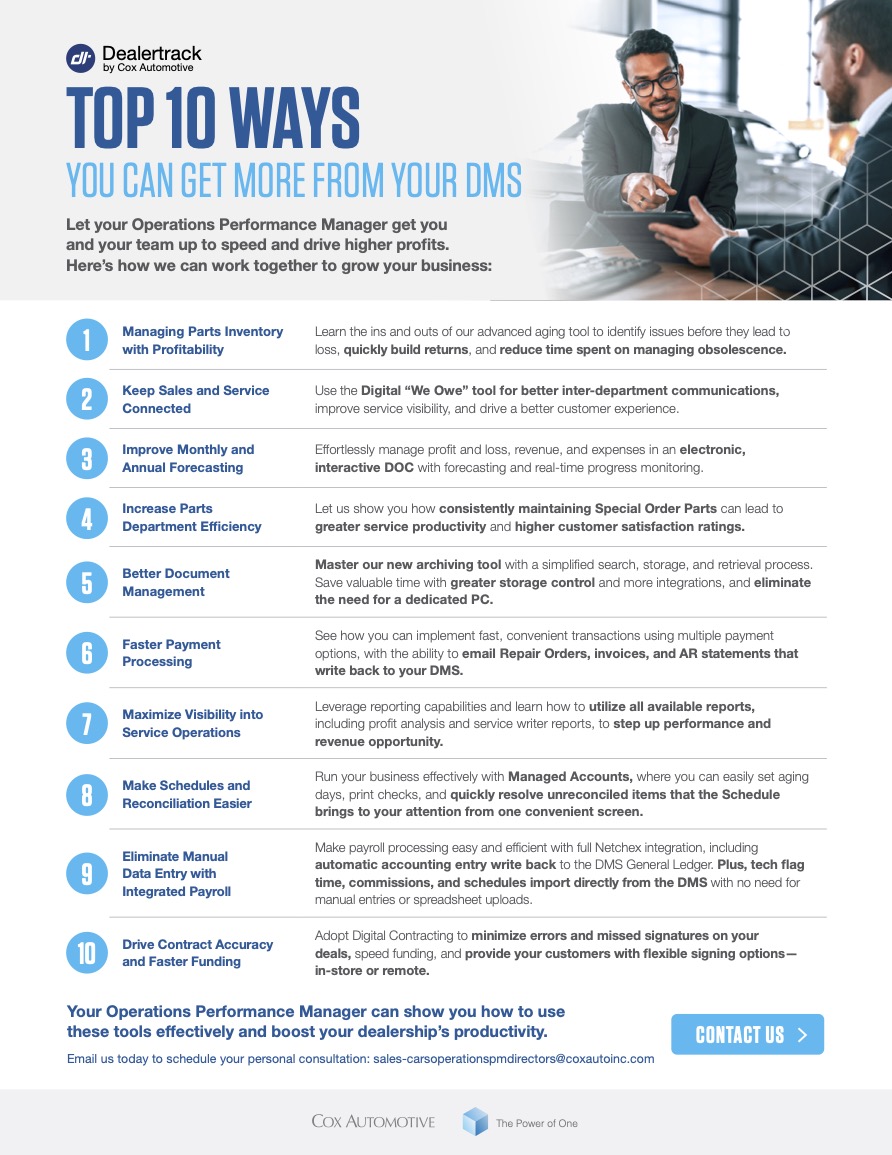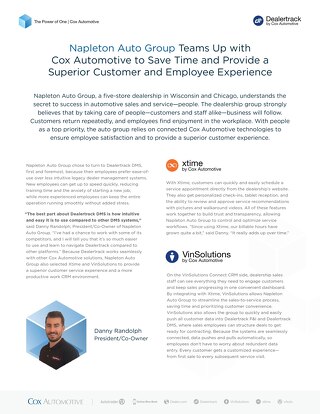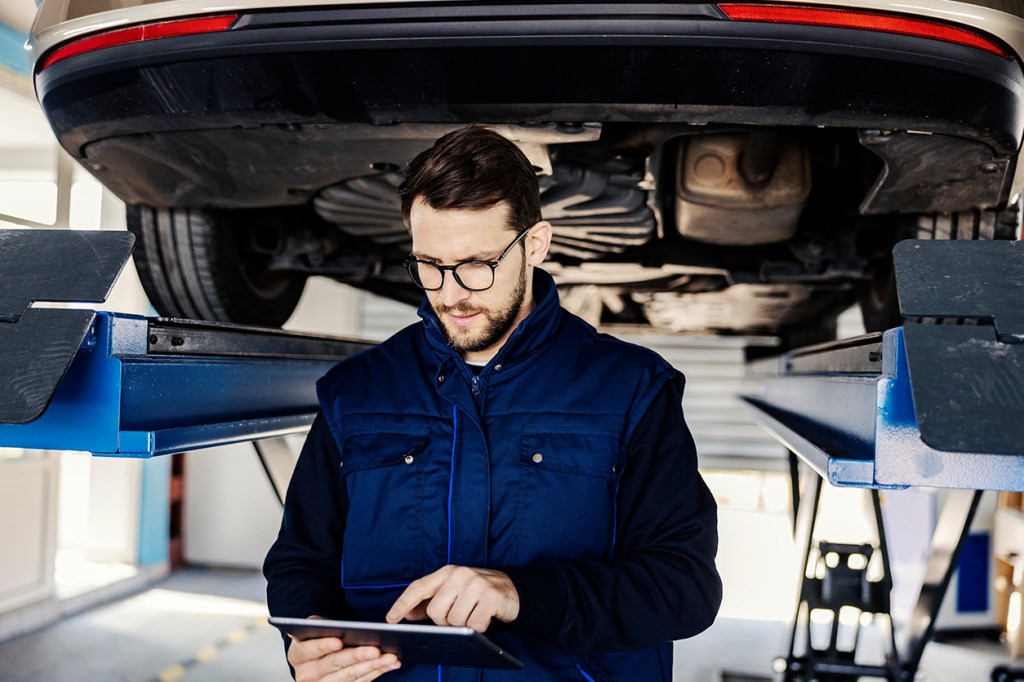NADA 2025 sets dealers like you at the forefront of technological advancement. This new year, your business stands to uncover trends that can potentially change forever how you interact with consumers, sell cars, manage your business and earn even more profit.
At NADA, we’ll show you how to streamline your transactions and boost profitability. New cutting-edge tech trends are set to simplify your workflows, enhance customer satisfaction, and drive more sales. So, where should you start? Read below to discover our top picks for the Can’t Miss Tech Trends at NADA 2025:
Experience Seamless Customer Journeys with Omnichannel Technology
Today’s consumers want a consistent, connected car-buying journey. In fact, according to Cox Automotive’s Car Buyer Journey study, 43% of recent car buyers used an omnichannel approach, and 71% are likely to do so in the future. That means more than 7 out of 10 shoppers will use multiple channels—online, in-store or some combination—to make their next vehicle purchase.
Omnichannel technology brings together connected dealership solutions to enable every path to purchase (from sales to service). It creates a consistent customer journey with data that follows customers as they shop online and in-store.
Embracing a multichannel experience not only facilitates unforgettable customer experiences but also empowers your dealership to build strong, profitable, and simplified workflows that boost operational efficiency. By leveraging omnichannel technology, you can seamlessly integrate online and in-store interactions, ensuring that data follows customers throughout their purchasing journey.
At NADA 2025, you can experience omnichannel technology with connected Dealertrack solutions. With Dealertrack, customers can start the deal online and not have to repeat steps when they come in-store. And, because data flows directly from the DMS, it streamlines the entire F&I process for faster funding.
Maximize Profitability with Real-Time Predictive Insights
The more you know about your customers, the better experience you can give them. This has always been true in automotive sales, but with the advent of AI automation and the ability to track shoppers online, insights are more powerful than ever before.
In 2025, predictive consumer insights will allow you to maximize the profitability of every interaction in several key ways. They will help you pull accurate data and build convenient automations in real-time, customize processes for out-of-state transactions, access deal insights and historical transactional data to help customers manage the deal-completion process, and much more.
At NADA 2025, you can experience predictive insights in action through several innovative Dealertrack solutions.
Automations
Advanced automations are streamlining the path to purchase and powering profitability for dealers. By enhancing productivity, streamlining processes, and reducing manual tasks, F&I technology ensures a simplified and efficient path to purchase.
Deliver Next-Level Service Backed by Unmatched Industry Experience
With so much customer information to keep track of and so many solutions to consider, having a trusted partner—one with unmatched industry experience—can give you a real competitive advantage in 2025.
As you consider the latest trends, look for technology that includes experts behind the scenes who relentlessly deliver customer experience infrastructure that no one else comes close to. But this is only the beginning. Make sure that you select a technology partner that can grow with your dealership, not one that you’ll quickly outgrow.
As the leader in automotive technologies, Cox Automotive continues to invest in client experience, speed to response, connecting solutions, training and more. At NADA 2025, you will have a chance to meet with Dealertrack Performance Management experts with an average of 10 years dealership experience each, who are committed to keeping your team and technologies on track and up to speed. It’s just one way Cox Automotive and Dealertrack are staying a step ahead of the technology curve.
Schedule a Dealertrack demo at NADA 2025 to experience omnichannel technology, predictive insights, and unmatched industry leading expertise.






 Jade Mitchell is a Sr. Manager of Client Performance Management who works with dealerships to maximize DMS utilization, as well as drive processes and profit improvement. Jade believes that the Automotive Industry is a game of inches in today’s world, so taking a deep dive with our dealers into their financials and processes by using the data that the DMS provides can make a huge impact on their success. Jade came to Cox Automotive in 2019 after working in automotive dealerships for over two decades. He started washing and detailing vehicles when he was only 13 years old which led to him becoming a finance manager at a very young age and spending the next decade in management. In addition to his passion for the Automotive Industry, Jade runs his nonprofit organization: Stay Positive Stay Aggressive Inc, which he established in 2013 to assist local families struggling with medical bills due to life-threatening illnesses. Recently, Jade and his wife Aubrey welcomed their first child into the world so between Dealertrack and daddy duty he is truly working 24/7 these days.
Jade Mitchell is a Sr. Manager of Client Performance Management who works with dealerships to maximize DMS utilization, as well as drive processes and profit improvement. Jade believes that the Automotive Industry is a game of inches in today’s world, so taking a deep dive with our dealers into their financials and processes by using the data that the DMS provides can make a huge impact on their success. Jade came to Cox Automotive in 2019 after working in automotive dealerships for over two decades. He started washing and detailing vehicles when he was only 13 years old which led to him becoming a finance manager at a very young age and spending the next decade in management. In addition to his passion for the Automotive Industry, Jade runs his nonprofit organization: Stay Positive Stay Aggressive Inc, which he established in 2013 to assist local families struggling with medical bills due to life-threatening illnesses. Recently, Jade and his wife Aubrey welcomed their first child into the world so between Dealertrack and daddy duty he is truly working 24/7 these days.





